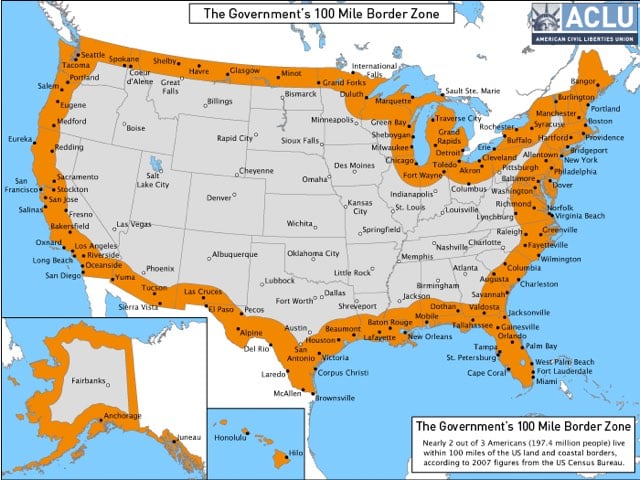The US border is 100 miles wide
Today I learned that the US government considers the US border as extending 100 miles into the country. This means that states like Maine, Michigan, and Florida are entirely within the border area and 2/3 of the US population lives within the border.

The problem with this, from the standpoint of the ACLU, is that Border Patrol agents have “certain extra-Constitutional powers” within this area and “routinely” overstep their bounds and violate the constitutional rights of innocent people.
See also 35 maps that explain how America is a nation of immigrants. (via @tcarmody)
Update: So, as you may know, I am not a Constitutional lawyer or even a regular lawyer. The ACLU presumably employs and/or utilizes experts on Constitutional and immigration law. But they have a viewpoint, right? They are interested in the civil liberties of individual Americans. Anyway, Scott Bomboy of the National Constitution Center (who is also not a lawyer), notes that the US has a couple of different ideas of what a border is and what can be done at or within each kind of border is slightly different.
Legally, the 100-mile-wide region is called the “extended border” of the U.S., as defined by Title 8 of the Federal Code of Regulations. There is also something called the “functional equivalent” border, which is the area around international airports in the interior region of the U.S.
The DHS ruling from last Friday said its “warrantless searches” applied to the U.S. “border and its functional equivalent,” with no mention of the extended 100-mile border.
Two analysis papers from the Congressional Research Service from 2009 offer some legal insight into what tactics agents can follow within the 100-mile-wide extended border, and why the distinction between the extended border and the other two borders is important.
Searches within the 100-mile extended border zone, and outside of the immediate border-stop location, must meet three criteria: a person must have recently crossed a border; an agent should know that the object of a search hasn’t changed; and that “reasonable suspicion” of a criminal activity must exist, says the CRS. (The service had done the legal analyses to prepare Congress members for legislation.)
“Although a search at the border’s functional equivalent and an extended border search require similar elements, the extended border search entails a potentially greater intrusion on a legitimate expectation of privacy. Thus, an extended border search always requires a showing of ‘reasonable suspicion’ of criminal activity, while a search at the functional equivalent of the border may not require any degree of suspicion whatsoever,” the CRS says.
In November of 2014, This American Life aired a piece on several people who record on video their interactions with Border Patrol agents at inland checkpoints.
So if you haven’t spent much time in the Southwest, you might not know about this. But there are these Border Patrol checkpoints that are just like in the middle of highway interstates and other roads, not at the border, not even near the border. They’re as far as 100 miles from the border.
There are dozens of these interior or inland checkpoints across the country. They’re mostly in California, Arizona, New Mexico, and Texas. But now there are a couple in Vermont, New Hampshire, and Washington state. You know that you’re approaching one of these checkpoints, because the speed limit will suddenly drop to 45 miles an hour and then 25. You’ll slow down, and you stop, you see these orange cones coming up. And then often there’s this big sort of tent-looking structure, like, right in the middle of the highway.
And then you stop, and you’re right in the middle of the highway. And an agent in uniform, an armed agent walks up and asks you questions like, are you an American citizen? Sometimes he asks to look in your trunk. All this so they can catch undocumented immigrants and drug smugglers.
I’ve been through one of these checkpoints in VT, about 40-50 miles from the Canadian border, and hey, these checkpoints really make you feel like a criminal…like if you seem nervous they’re going to pull you over and detain you because you seem like you’ve done something wrong. And that’s what the ACLU is concerned about: Border Agents routinely treating law-abiding US citizens as criminals far from their true areas of jurisdiction. Again from This American Life, one guy got his car window broken at a checkpoint because he did not want to cooperate with the agents:
Violence like this doesn’t happen a lot in these videos, but it does happen. Agents also broke the window of that pastor I mentioned earlier, Steven Anderson. They tased him and bloodied his face.
In Robert’s case, he says the agents seized his cameras, put him in handcuffs, drove him far away to a holding cell, and detained him for hours. Then they drove them even farther away to El Cajon, California, let him out late at night at a bus station, and drove off.
You can watch the video here:
The glass is broken at ~11:00. (thx, @harryh & martha)





Stay Connected